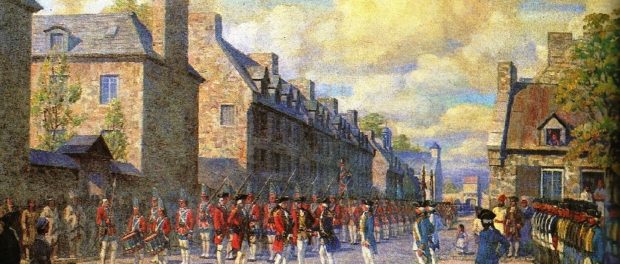1760: The Capitulation of Montreal & Other Quebec Curios
Part of “Je me souviens: New France, 1534–1763”
 Artistic depiction of the Capitulation of Montreal. c. 1800. Artist unknown. Source: Virtual Museum of Canada.
Artistic depiction of the Capitulation of Montreal. c. 1800. Artist unknown. Source: Virtual Museum of Canada.
After the Battle of the Plains of Abraham, in which both the English and the French commanders died, both sides continued taking up their arms and fighting each other. With the capture of Quebec following the battle, the British set their sights on Montreal. British armies led by Jeffrey Amherst (coming from the west) and one James Murray (coming from Quebec) descended from towards the island, joined by another army coming from the south. Montreal was effectively surrounded. General Vaudreuil called a war council on September 6 to discuss with trusted advisors about possible actions, but the numbers were clear: the British outnumbered the French by almost 9 men to 1, and in addition, Montreal did not have any fortifications to protect it. There was no way other than surrender to avoid a bloodbath and a ransacking of the city. On the 8th of September 1760, Montreal surrendered.
Traditionally, with the surrender, there would be the offer of the honours of war, a ceremony extended to the defeated by the conqueror to show their recognition of their enemy’s valiant performance during the battle. The ceremony would of a march by the defeated armies out of the conquered place, with their country’s flags unfurled and often to music, after which the city and property would be taken officially by the victor. However, the British would allow no such thing, and already-existing tensions between the French and British armies rose. The Chevalier de Lévis burned the flags of New France instead of surrendering the flags of their country whole.
The capitulation of Montreal came with the signing of certain articles between the people of New France and their effective conquerors. Amherst negotiated for the British, while General Vaudreuil negotiated for the French. Through these negotiations, property rights according to the Coutume de Paris (the genesis of civil law in Quebec) were guaranteed, as well as the freedom to practice Catholicism. However, this was a temporary grant as well. If the British did effectively manage to capture New France by the end of the war, this agreement gave the colonists of Montreal the choice to return to New France. Unknown to both parties at the time, the capitulation of Montreal would mark the unofficial end of New France. The treaty that would make their conquering official, however, would have to wait for three years until the entirety of the fighting ended. In the meanwhile, New France’s possession by the British was all but official.
Read the Articles related to the Capitulation of Montreal here.





